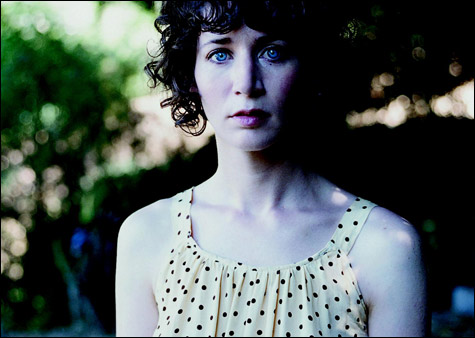
TA-DAH!: July’s scenarios may be creepy, but they’re also compelling.
|
|
No One Belongs Here More Than You
| by Miranda July | Scribner | 220 pages | $23
|
In photographs, indie wünderwaif Miranda July — writer, performance artist, director and star of Me and You and Everyone We Know — stares back at us with big, wet blue eyes, curls dangling about her face, lips glistening and parted just so. It’s as much a pose as if she’d raised her arms in a ta-dah! position; she knows how to get a reaction. Her face telegraphs mixed signals: it’s dollish and adult, a combination of innocence and sexuality — qualities that also make her debut collection of stories both captivating and discomforting.
July is perhaps still best known for her performance art, and a live-action effect flavors these 16 stories. All but two are told in the first person, and they often read like monologues; the classic no-no of reading the “I” as the author is unavoidable. In the single-page “The Moves,” a father teaches his daughter his finger movements for getting a woman off. “There were twelve moves in all. He did them on my hand like sign language. . . . Still fingers held like silence for a beat, and then long quick strokes that he called ‘skinning.’ ” Creepy? Maybe. But for the narrator — who remembers his advice “Don’t wait to be sure or you’ll miss the boat” — it’s solace, inspiration. “Each morning when I try to motivate toward something positive,” she says, “I think of him saying this, and it is a great comfort.” Readers may find such statements less reassuring. That July’s characters don’t flinch in her scenarios — a phone-sex habit between two sisters; a woman happening upon author Madeleine L’Engle’s husband having an affair; two middle-aged men finding each other on ecstasy — makes the stories all the more unsettling.
July practices the whole magic-in-the-quotidian routine, and she does it well. In “Something That Needs Nothing,” a teenage runaway falls hard for a girl who’s giving her a ride in a van: “I looked out the window for other passengers in love with their drivers, but we were well disguised, we pretended boredom and prayed for traffic.” “The Swim Team” seems at first a bit of whimsy: a woman in Nevada gives swimming lessons to three geriatrics in her kitchen, and July conveys the joy of these octogenarians doing the butterfly across the floor. But the narrator/swim coach’s impulse is sparked by a moment of uneasiness: “I was looking down at my shoes on the brown linoleum floor and I was thinking about how I bet this floor hadn’t been washed in a million years and I suddenly felt like I was going to die. But instead of dying, I said: I can teach you how to swim. And we don’t need a pool.” These “swimmers” — at the end of their lives — are all that the narrator has. July dances between innocence and the discomfort of awareness.
The isolation and the yearning for connection manifest themselves in these characters’ emotional clumsiness. Will they cry or kiss? Touch or walk away? A special-needs assistant has an affair with one of her teenage students; two teenage girls run away together and prostitute themselves to pay the rent; an accountant’s secretary joins a sewing class to connect with her boss’s wife; two women at a romance seminar meet and weep. The eroticism is, by turns, dank, chilling, fervent, wonderful. The situations — often inappropriate, sometimes illegal — are as alluring as they are repellent. We might shudder, but July makes it difficult to look away.